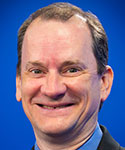NJCPA Looks to Rebuild Accounting Talent Pipeline
By Don Meyer, CAE, NJCPA Chief Marketing Officer –
June 5, 2024

The NJCPA is aiming to help firms and businesses find more accounting talent in 2024 and beyond, as demand for young people to succeed retiring accountants continues to grow.
The ongoing talent shortage known as the pipeline problem has created a crisis in the profession in which talent is in high demand but fewer people are studying to be accountants and even fewer are becoming CPAs. A host of factors are contributing to the pipeline problem, like the challenging CPA Exam, comparatively low starting salaries and concerns about work-life balance, to name a few.
Identifying Opportunities
In summer 2023, the NJCPA formed the Pipeline Task Force, headed by Zack Cohen, CPA, senior manager at CFGI and chair of our Emerging Leaders Council. The group, which included a diverse set of members, developed a set of actionable and measurable recommendations that identified areas that need improvement; practices and programs that the NJCPA should launch, continue or ramp up; where to direct resources; and where further research is needed. Three areas of focus were identified:
- Raising awareness of the profession among high school students and addressing negative perceptions among college students and recent grads.
- Removing obstacles to licensure and improving access to resources.
- Engaging with and getting buy in from key professionals at firms, companies and in academia.
To raise awareness of the profession among high school students, the task force recommended conducting year-round outreach to high schools and educators, connecting firms and companies with high schools in their areas and promoting positive accounting stories through social media, blogs and podcasts. Members agreed that CPAs need to tell more success stories and fewer war stories.
The task force also said that the intersection of the NJCPA s pipeline and advocacy efforts can support the development of more accounting classes in high schools and make headway toward getting accounting recognized as a science, technology, engineering and math or STEM program.
Expanding the Path to CPA Licensure
Among the obstacles to licensure discussed by the task force was the 150-hour education requirement. Some believed that the additional year of education and costs associated with it are a significant barrier to potential accounting students and those who may sit for the CPA Exam.
The NJCPA has joined the national conversation about the 150-hour requirement and is monitoring efforts around the country to create additional pathways to licensure for CPA candidates. A bill backed by the Minnesota Society of CPAs that would ease the path to a CPA license is moving forward. The bill would maintain the current 150-credit-hour rule but would offer an additional option to licensure with a bachelor s degree (120 credits) and two years of work experience.
Additionally, the NASBA Professional Licensure Task Force is studying a structured experiential learning program that would provide for education, documented experience and other elements that would offer an equivalent path to licensure without needing a fifth year to complete a 150-hour education program. This additional path, to be defined in greater detail, would include an education and experience component to measure a participant s competency to be licensed as a CPA and would be considered equivalent to the current 150-hour pathway defined in the Uniform Accountancy Act.
Research shows that we have much more work to do around awareness and perceptions of an accounting career. The pipeline problem will not be solved this year or next. The NJCPA, as well the other state CPA societies and the AICPA, are developing multiyear, collaborative, data-driven campaigns that will address the continuing accounting pipeline challenges.
 | Don MeyerDon Meyer, CAE, is the chief growth officer of the New Jersey Society of CPAs, where he is responsible for setting the vision, strategy and direction for the organization’s marketing, communications and membership campaigns and for driving the success of a deep and broad swath of organizational initiatives. More content by Don Meyer: Learn more from Don Meyer: |
This article appeared in the Summer 2024 issue of New Jersey CPA magazine. Read the full issue.